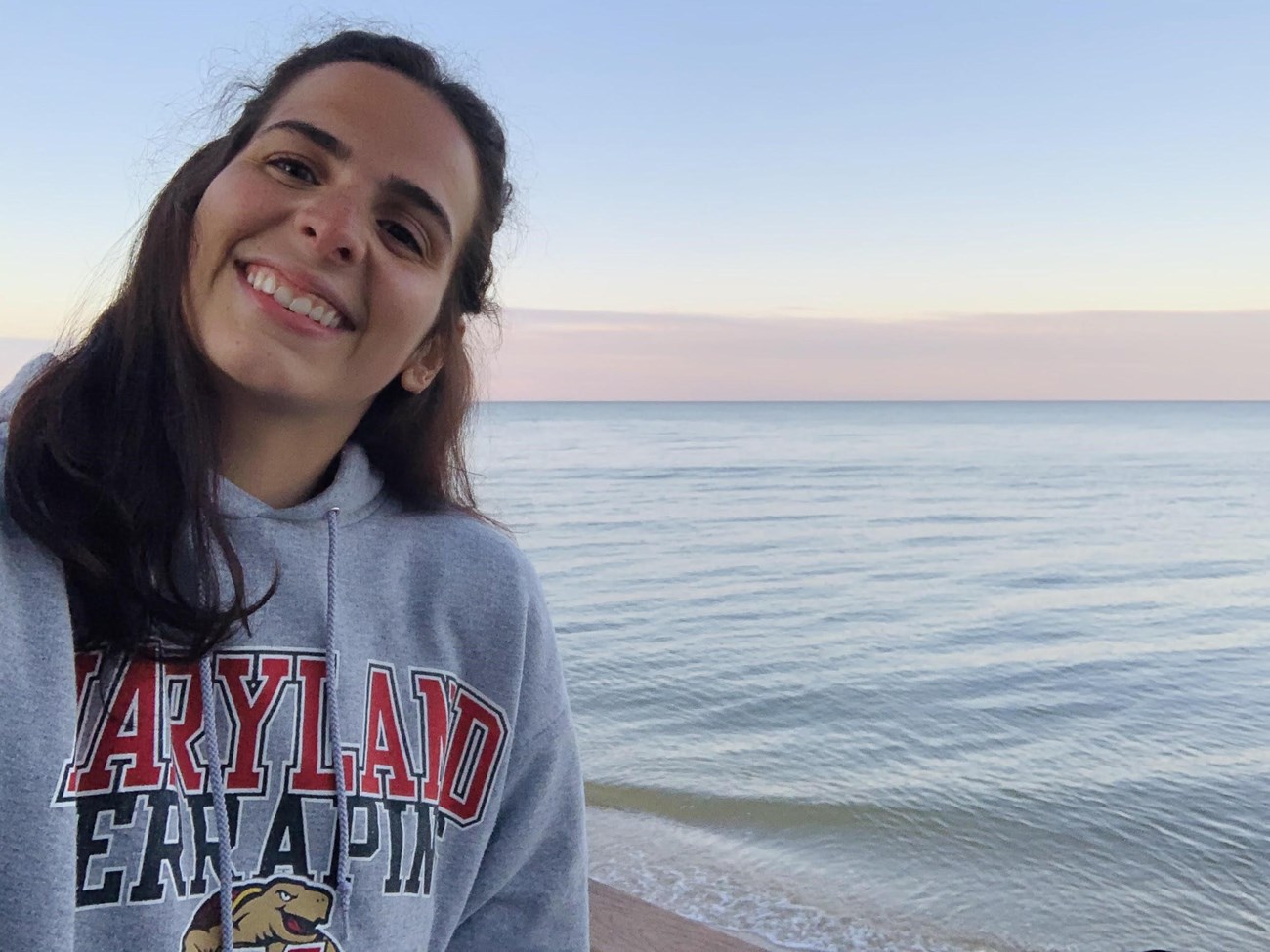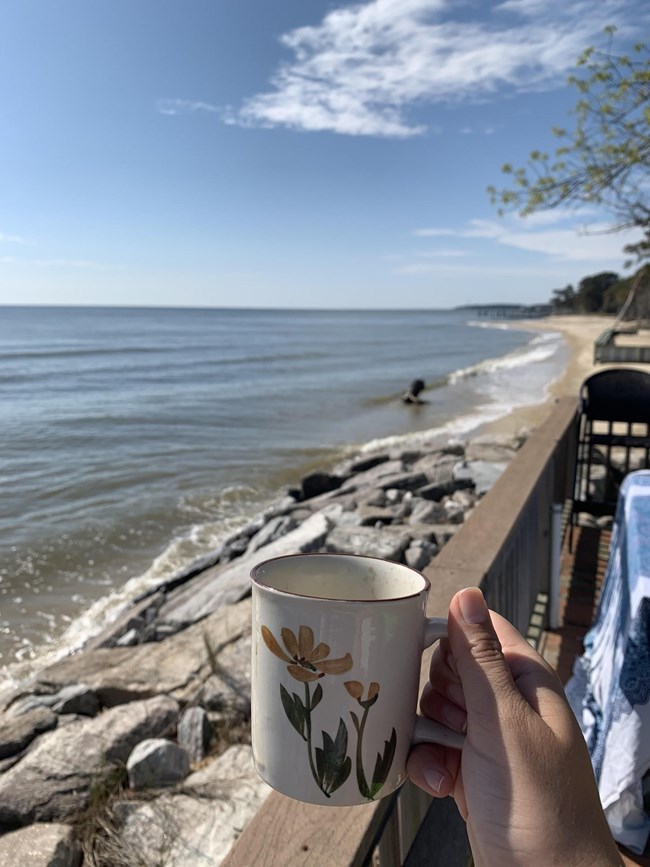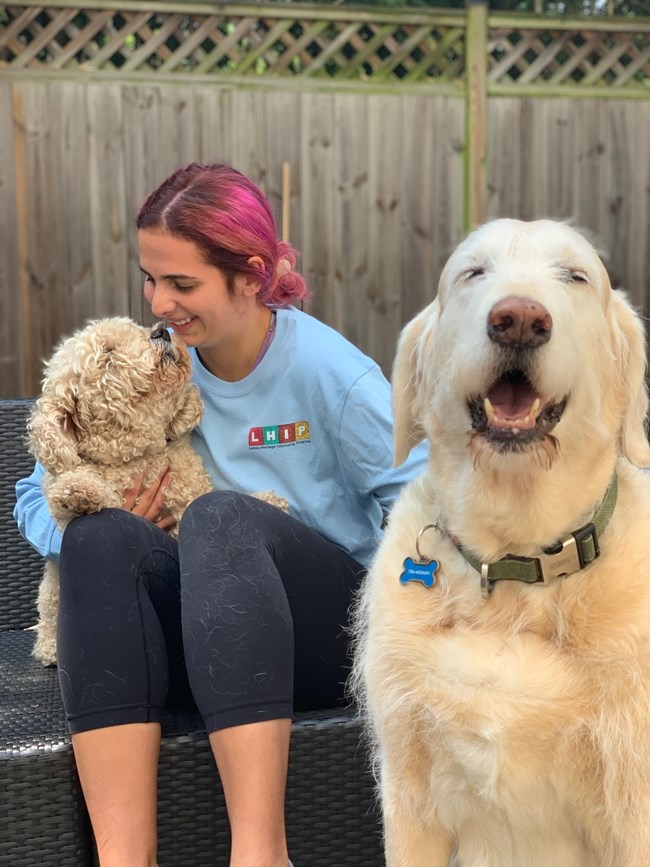Last updated: August 27, 2020
Article
Andrea Miralles-Barboza

Courtesy of Andrea Miralles-Barboza
What is your name and job title? What is your background?
My name is Andrea Miralles-Barboza, I am a Latino Internship Heritage Program (LHIP) intern working for the National Park Service’s (NPS) Citizen Science Steering Committee. I am 24 years old, and I am a Venezuelan-American. I have lived in Boston, Caracas, Miami and Maryland. I have my B.S. from the University of Maryland in Environmental Science and Policy with a concentration in Environmental Anthropology. I have worked in a water quality lab, as a dog walker, in the non-profit sector, as a Teaching Assistant and Research assistant, as a translator and now for the National Park Service.
As a graduate student at the University of Maryland’s Marine Estuarine Environmental Sciences (MEES) program, I study and research adaptation responses to displacement from climate change. I am specifically interested in how coastal residents on the Eastern Shore of Maryland will respond to issues of displacement, with a focus on issues of equity when it comes to climate displacement. Climate change does not impact all equally and not all people have the same means to respond, this is important to study and understand to get at some of the really important issues of environmental justice for the future. To me, understanding how vulnerable coastal areas like the Eastern Shore will respond to climate displacement is a first key step in understanding how we can start making more equitable climate adaptation responses.
What made you want to get involved with your specific internship program and with the NPS?
What made me want to get involved in my internship program is the emphasis that LHIP places on empowering young Hispanic/Latinx professionals in getting involved in the National Park Service. I think that most people just think of parks when they think of NPS; but really NPS is about cultural, historic and natural resources so when we are talking NPS we are really talking about a federal agency that wants to learn about and preserve culture just as much as it wants to preserve protected monuments and parks. With these agency goals, and with Hispanic culture being such a big part of the United States, it makes sense that NPS staff should be a representation of what our country looks like and I think LHIP does a really good job of bridging that gap.

Courtesy of Andrea Miralles-Barboza
What does your job involve? What are the types of things you work on?
In my position I work for the NPS Citizen Science Steering Committee. This is a group within the NPS that works to understand how citizen science is happening throughout the park service, what kinds of things we can use citizen science for, and how we can increase its use throughout the park service as both a tool to engage and teach park visitors about the scientific process and to accomplish NPS goals. Citizen science, for those who are unfamiliar with the term (like I was until pretty recently) is collaboration in the scientific process between scientists and volunteers. This is a really good way to get people familiar with the scientific process and to help do science more efficiently since more people are involved in data collection and analysis.
The main project I work on for the committee is creating an inventory of NPS citizen science projects that engage Latinx audiences. Engagement can look like lots of things like programming/materials available in Spanish, the presence of bilingual interpreters or researchers or even projects occurring in parks that have predominantly Latinx visitors. In identifying these projects and creating this inventory, I am hoping to identify some of the factors that make citizen science projects accessible to all people. And, also importantly, to identify what kinds of challenges and barriers exist to meeting this goal. Citizen science is a very empowering tool, especially to increase diversity and representation of Latinx communities in STEM by giving those communities hands on scientific experiences. So, I think it is a really cool project to work on to try and understand how (or how not) citizen science projects in NPS are engaging Latinx visitors.
What is the most rewarding part of your internship?
The most rewarding part of my internship is getting to put some of my “anthropological” training to work (that is: having conversations through email/ phone-calls/video-conferences with NPS people from all over the country) and hearing of all the existing and planned NPS efforts to engage Latinx visitors. I think NPS is really aware that the agency itself and its visitors might not necessarily represent what the country actually looks like, but all over the country I get responses of these efforts taking place. While not all the efforts are in citizen science specifically, efforts to make NPS a more accessible agency are very apparent. I think finding out that you are truly supported/backed by the people you work for is extremely rewarding.

Courtesy of Andrea Miralles-Barboza
How has your cultural heritage or background influenced your or tied into your work? What about your heritage would you like to share with others?
Being Venezuelan American, I think a lot of the way that my cultural background gets tied into my work both academically and professionally is through an awareness of how much natural resources really shape the reality of our everyday lives. In Venezuela, one of the many issues that the country faces is that it is a petroleum rich nation, but management of these resources over the last two decades has taken advantage and exploited this natural resource. For the people of Venezuela, unregulated control to petroleum has created issues that may last for centuries. Then growing up in Miami, around every Hispanic group possible, I understood from a very young age that this kind of thing happened in a lot of Central and South American countries. Natural resources when handled improperly or when exploited, can lead to social and political turmoil.
These are the kinds of things that led me to be interested in how human-environmental issues could start to be addressed with both consideration of the environmental factors that shape humans as well as the social/economic/political/historical factors that shape the world. In this way, leaving out the social factors when addressing environmental issues makes no sense. I think my cultural heritage and my exposure to so many different cultures from a very young age also helped me understand the concept of resilience, both environmentally and socially. Understanding how environmental and social factors shape our world and understanding how people and the environment are resilient in the face of change are topics I have been interested in my whole life, and a lot of this interest is due to where I come from, the people I have lived around and places I have lived.
What would you like to share with other people who may be in your job or in stewardship?
What I would like to share with people interested in working in conservation/stewardship/the environmental field in general is to try and work with people with really different backgrounds from yours. Whether that be different in race, ethnicity, age, academic/professional training; when we work with people who disagree with us or look at a problem in different ways than we would regularly view it, we develop solutions that address much more complex issues. Not only do we increase our ability to solve complex issues, but we can also start looking at issues with different lenses which I really think is what topics like climate change, food security and biodiversity conservation (to name a few) all need. I think it is also worth mentioning that obviously no environmental issue can be solved by any one person, and thinking that will cause more stress than anyone knows what to do with. So, finding things outside of work and school that make you happy whether it be baking, exercising, enjoying nature, listening to true crime podcasts or dying your hair a funky color (if you couldn’t tell, these are mine haha!) ultimately make the work you do better and take the weight of the environmental world off your shoulders.
